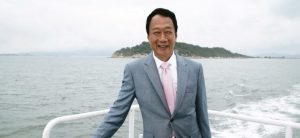Tech Billionaire Declares For Presidency
OpenLife Nigeria has reliably gathered that Terry Gou, founder of iPhone assembler Foxconn, has said, early Monday, that he would make an independent bid for Taiwan’s presidency.
The billionaire’s interest has inexorably added to an increasingly crowded field of the country’s presidential aspirants.
The election, according to information, is fixed for January 2024 .
The 72-year-old tech billionaire’s announcement makes him the fourth candidate for the position.
He is expected to slug it out with other political heavy weights like Vice President Lai Ching-te of the ruling Democratic Progressive Party, DPP, Taiwan People’s Party Chairman, Ko Wen-je as well as New Taipei Mayor, Hou Yu-ih of the China-friendly Kuomintang (KMT).
Gou also pledged to grow Taiwan’s economy and boost its technological prowess, saying he will “make Taiwan overtake Singapore within 20 years” and have the highest GDP per capita in Asia. “If Singapore can do it, so can Taiwan,” he said.
“We need to pull the country back to the path of peace and prosperity through this election. Only by doing so can hundreds of industries safely develop and can people live and work in peace and contentment.”
The businessman with close ties to China also said he would ensure peace across the Taiwan Strait.
“Taiwan should absolutely not become Ukraine. I shall never let Taiwan be the next Ukraine,” said Gou, who is known as Guo Tai-ming in Chinese.
“I can guarantee that I’ll bring 50 years of peace to the Taiwan Strait.”
Meanwhile, on Friday, August25, Vice President Lai Ching-te of the ruling Democratic Progressive Party was the front-runner in a poll published by the news site My Formosa.
In a scenario of the four candidates, the vice president garnered 39.1% of support. Gou was in last place with 12%. His entry is widely seen by analysts as benefiting the ruling party candidate by splitting opposition votes.
In his press conference, Gou attacked the “corrupt and useless” DPP’s record of government, and argued mainstream public opinion turned against the party in last November’s local elections. But the opposition has failed to unite, he warned, in a thinly veiled swipe against the KMT and its embattled nominee Hou.
Gou’s move follows his loss of the KMT nomination to Hou, the second time he has failed to secure approval from the party. Gou sparked months of speculation five years ago that he would run as an independent.
“Now he is on par with Ko and Hou, and can bargain as a fellow presidential hopeful. These are negotiation tactics,” Huang told Nikkei Asia. “The objective for Hou, Ko and Gou is to produce a united ticket against Lai. Otherwise the votes will be split, heavily weakening the opposition.”
Gou needs sufficient nominations to officially become a presidential candidate in November. That shouldn’t be a problem but “it doesn’t mean he’ll necessarily do so,” Huang said. “It depends on the negotiations.”
Gou has said several times previously that his 40 years of industry experience makes him the best choice to navigate Taiwan through U.S.-China tensions.
He has visited the U.S. twice and Japan once this year, meeting industry leaders such as Open AI founder Sam Altman, economist Thomas L. Friedman and former Japanese Prime Minister Taro Aso.
The presidential race comes at a critical time as China has stepped up its military aggression and political coercion against Taiwan.
Earlier this month, the Beijing banned Taiwanese mango imports, threatened to walk back from a major trade pact and sent warships and planes near Taiwan — moves widely seen as an effort to intimidate Taiwanese voters.
Beijing has never ruled Taiwan but claims it as its territory, refusing to rule out using force to take control of the democratic island.
Born on October 18, 1950 in Banqiao Township, Taipei County (now Banqiao District, New Taipei) Gou grew up with his parents who lived in mainland China’s Shanxi Province before the Chinese Civil War and fled to Taiwan in 1949.
His father was a policeman who fought on behalf of the Kuomintang during the war.
As the second child of his family, Gou received education from elementary school to post college. After graduation, he continued to work in a rubber factory, working at a grinding wheel, and medicine plant until the age of 24.
Gou has an older sister and two younger brothers, Gou Tai-chiang and Tony Gou, who have both become successful businesspeople as well.
Gou fulfilled his national service obligations by joining the Republic of China Air Force as an anti-aircraft artillery officer.
As part of the airforce, he was stationed in Kinmen at a time when a potential People’s Liberation Army invasion of the island as a stepping stone to invade Taiwan was a real fear.
The Taiwanese billionaire businessman and politician is the founder and former chairman and chief executive officer of Foxconn, the world’s largest contract manufacturer of electronics.
Founded in 1974, Foxconn grew to become an international business empire, becoming the largest private employer and exporter in mainland China with a workforce of 1.2 million. As of 2022, Gou had a net worth of US$6.8 billion.
Beginning in 2016, speculation surrounding Gou’s political ambitions arose ahead of the 2020 presidential election.
In 2019, Gou resigned from Foxconn and joined the Kuomintang (KMT) to run for president, declaring he was instructed by the sea goddess Mazu in a dream to contest the election.
Gou ultimately lost the election, coming in second in the Kuomintang primary. After leaving the party following the 2019 primary, Gou rejoined in 2023 and announced his intention to run for president in the 2024 presidential election.
Once described as an “old friend” by Chinese leader Xi Jinping, Gou has been characterized as friendly to Mainland business interests during his political and business career.
In December 2022, Gou was credited with helping to successfully lobby the Xi Jinping Administration to ease zero-COVID rules implemented during the pandemic.
On foreign policy, Guo has criticized the Taiwan independence movement and has called for a de escalation of Sino–American tensions.
Owing to his business background and image as a political outsider, Gou has been compared in international media to former U.S. President Donald Trump.







